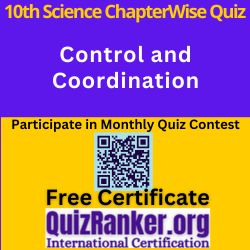10th Science Control and Coordination MCQ Test Chapter 6: Enhance your understanding with free online multiple-choice questions for CBSE Class 10 Science Chapter 6. Learn about the mechanisms of control and coordination in organisms, including the nervous and endocrine systems. Ideal for CBSE exam preparation and competitive tests.
Science Control and Coordination MCQ Test Quiz
Chapters of 10th Science for MCQ Test
You can not only check your knowledge about for “10th Science Control and Coordination MCQ Test Chapter 6” but also all remaining chapters multiple choice questions.
Chapter 1 Chemical Reactions and Equations MCQ Test
Chapter 2 Acids, Bases and Salts MCQ Test
Chapter 3 Metals and Non-metals MCQ Test
Chapter 4 Carbon and its Compounds MCQ Test
Chapter 5 Life Processes MCQ Test
Chapter 6 Control and Coordination MCQ Test
Chapter 7 How do Organisms Reproduce? MCQ Test
Chapter 8 Heredity MCQ Test
Chapter 9 Light – Reflection and Refraction MCQ Test
Chapter 10 The Human Eye and the Colourful World MCQ Test
Chapter 11 Electricity MCQ Test
Chapter 12 Magnetic Effects of Electric Current MCQ Test
Chapter 13 Our Environment MCQ Test
Also Attempt Free 10th class Math chapter wise MCQ Quiz [For Exam 2025]
Must Attempt Monthly Quiz Contest
- Class 9th Science quiz contest monthly
- Class 9th Math quiz contest monthly
- Class 10th Science quiz contest monthly
- Class 10th Math quiz contest monthly
You can also participate in yearly national quiz contest Dec 2024
Important Link
- NCERT Books PDF
- Our Youtube Channel(Subscribe for view Few Quiz Question Answers)
About Science Control and Coordination MCQ Test
Chapter 6 of the CBSE Class 10 Science curriculum, titled “Control and Coordination,” delves into the mechanisms by which organisms regulate and coordinate their internal processes to respond to environmental changes. This chapter is crucial for students aiming to understand how living organisms maintain homeostasis and adapt to their surroundings. The free MCQ quiz provided in this chapter will help students reinforce their knowledge and prepare effectively for their CBSE examinations.
Key Concepts Covered:
- Control and Coordination in Animals:
- Nervous System:
- The nervous system controls and coordinates body functions through electrical signals.
- It comprises the central nervous system (CNS) and the peripheral nervous system (PNS).
- The CNS includes the brain and spinal cord, which process and integrate information.
- The PNS consists of sensory and motor neurons that transmit signals between the CNS and the rest of the body.
- Reflex actions are automatic responses to stimuli mediated by the spinal cord.
- Endocrine System:
- The endocrine system regulates body functions through hormones, which are chemical messengers released by glands.
- Major endocrine glands include the pituitary gland, thyroid gland, adrenal glands, and pancreas.
- Hormones control processes such as growth, metabolism, and reproduction.
- Examples of hormones include insulin (regulates blood sugar), thyroxine (regulates metabolism), and adrenaline (prepares the body for stress).
- Nervous System:
- Control and Coordination in Plants:
- Growth Hormones:
- Plants use hormones to regulate growth and respond to environmental stimuli.
- Major plant hormones include auxins, gibberellins, cytokinins, and abscisic acid.
- Auxins promote cell elongation and are involved in processes such as phototropism (growth towards light) and gravitropism (growth in response to gravity).
- Gibberellins influence seed germination, flowering, and fruit development.
- Response to Stimuli:
- Plants respond to external stimuli such as light, gravity, and touch through various mechanisms.
- Tropisms are directional growth responses to environmental stimuli.
- For example, plants grow towards light (positive phototropism) and roots grow downward (positive gravitropism).
- Growth Hormones:
- Homeostasis:
- Homeostasis is the maintenance of a stable internal environment despite external changes.
- In animals, homeostasis involves regulating body temperature, pH levels, and fluid balance through feedback mechanisms.
- In plants, homeostasis includes regulating water loss through transpiration and stomatal openings.
- Feedback Mechanisms:
- Feedback mechanisms help maintain homeostasis by regulating physiological processes.
- Negative feedback mechanisms counteract deviations from a set point, bringing the system back to equilibrium.
- For example, if body temperature rises, mechanisms such as sweating and vasodilation help cool the body down.
Quiz Structure:
The MCQ quiz for this chapter includes a series of questions designed to test students’ understanding of control and coordination mechanisms in both animals and plants. These questions cover the functions of the nervous and endocrine systems, plant hormones, and feedback mechanisms. The interactive format allows students to practice and assess their knowledge effectively.
Conclusion:
Practicing with the 10th Science Control and Coordination MCQ Test Chapter 6 is an excellent way for CBSE students to prepare for their exams. This chapter provides a comprehensive understanding of how organisms control and coordinate their internal processes to adapt to environmental changes. The MCQ quiz helps reinforce these concepts, ensuring students are well-prepared for their academic assessments and competitive exams.
